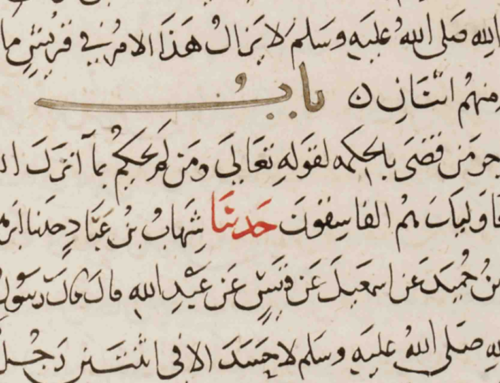By Mawlana Yunus Jaunpuri
Translated by Muhammad Habib
[Shaykh al-Hadith Mawlana Muhammad Yunus Jaunpuri was asked why the scholars of hadith did not generally give credence to the hadiths reported by Sufis, despite their closeness to Allah and lofty rank. He answered:]
Scholars have not given credence to the [hadith] reports of Sufis, as these respected people, due to their preoccupation with acts of devotion (‘ibadat), are unable to fully dedicate themselves to [the seeking of] knowledge. This is why their reports are littered with errors and confusions. Likewise, their husn al-zann (good opinions regarding others) is to such a degree that they do not even make critical analysis and, consequently, accept any spoken word without investigation. This is why their reports contain weak, rejected and fabricated hadiths in abundance.
This becomes evident after seeing Abu Talib Makki’s Qut al-Qulub and the works of Imam al-Ghazali, Abu ‘Abd al-Rahman al-Sulami and others.
‘Allamah Taj al-Din al-Subki has compiled all those countless reports which Imam al-Ghazali has mentioned in Ihya’ al-‘Ulum, but are not found elsewhere. There are, however, many reports which do exist either in wording or meaning.
The truth is that every art has its connoisseurs. We gladly accept that the Sufis are worthy of veneration. However, that does not mean we also accept their word in those sciences in which they do not specialise.
Yahya al-Qattan says: ”We have not seen the pious (Sufis) more imprecise in anything as they are in hadith.” Another variation reads, “We have not seen the people of good (Sufis) more imprecise in anything as they are in hadith.”
Explaining this, Imam Muslim (pg. 14) writes: “Imprecision finds its way on to their tongues but they do not intend it.”
Imam al-Nawawi elaborates: ”This is so because of their non-possession of the skills employed by the people of hadith, and hence, error creeps into their reports without their knowledge and they tend to relate inaccurate reports not suspecting them to be false.”
However, no one has rejected the reports of those Sufis who have gained proficiency in this science. For example, Imam Abu Isma’il al-Ansari al-Harawi (d. 481 AH), the author of Manazil al-Sa’irin, was a Sufi as well as a hadith scholar. His work, Manazil al-Sa’irin, is a renowned work of tasawwuf, of which al-Hafiz Ibn al-Qayyim wrote an extremely detailed commentary, entitled Madarij al-Salikin.
Similarly, the student of Imam Muslim, Ibrahim ibn Muhammad ibn Sufyan and his student Abu Ahmad al-Jaludi and others were all from amongst the ascetic Sufis, and people (hadith scholars) have accepted their reports.
The hadith scholar, Abu ‘Abd Allah Yunini, is from amongst the great Sufis. He attained the mantle of tasawwuf from the respected Shaykh ‘Abd Allah al-Bata’ihi, who is from the companions of Shaykh ‘Abd al-Qadir al-Jilani. [Abu ‘Abd Allah] Yunini is also a renowned hafiz of hadith. Al-Hafiz al-Dhahabi has specifically mentioned him in Tadhkirat al-Huffaz (Vol. 4, p. 223).
Similarly ‘Abd al-Rahman ibn Muhammad al-Dawudi (d. 467 AH) is a renowned Sufi. Al-Hafiz al-Sam’ani relates in Al-Ansab: ”He was a master in tasawwuf”, and he is from amongst the transmitters of [Sahih] al-Bukhari.
The likes of ‘Allamah Ibn Daqiq al-‘Id and Ibn al-Humam and others being Sufis is a known fact.
[Finally], all praise is due to Allah, most of our shaykhs of the Wali Allahi tradition were Sufis as well as imams of hadith.
That is the bounty of Allah, He grants to whom He wills.
Only Allah knows best.
The servant
Muhammad Yunus
(may Allah forgive him)
Monday 11th Rabi’ al-Thani 1391 AH.
(Al-Yawaqit al-Ghaliyah fi Tahqiq wa Takhrij al-Ahadith al-‘Aliyah, Volume 1, 1st edition (UK: Majlis Da’wat al-Haqq, p. 128-129), collated by Mawlana Muhammad Ayyub Surti.)







Assalamu alaykum wa rahmatullahi wa barakatuhu!
“[Finally], all praise is due to Allah, most of our shaykhs of the Wali Allahi tradition were Sufis as well as imams of hadith.”
By Wali Allahi tradition he means Shah Wali Allah Dihlawi’s tradition?
By Wali Allahi tradition he means Shah Wali Allah Dihlawi’s tradition?
Yes.
Assalaamu ‘Alaikum. Can you provide a review on this book, Al-Yawaqit al-Ghaliya? Is it in Arabic or Urdu? Is it a difficult book to read for the layman? Would you recommend it? Any feedback is appreciated. Jazakumullah. Wassalaam.
“Likewise, their husn al-zann (good opinions regarding others) is to such a degree that they do not even make critical analysis and, consequently, accept any spoken word without investigation”.
The husn al-zann is in THESE words, although it seems that the great masters of Sufism like Ghazali or Sulami were guillibles without any attention in taking their Din.
Actually, sufis have THEIR SPECIFIC STANDARDS in accepting traditions and taking their religion(see what Shaykh Ibn ‘Arabi wrote in Kitab al-Fana fi mushahada), but this is something that some ‘ulema cannot understand…
PS: I’m sorry for my english. I don’t like this barbaric western language 😀 (I’m joking ;)).